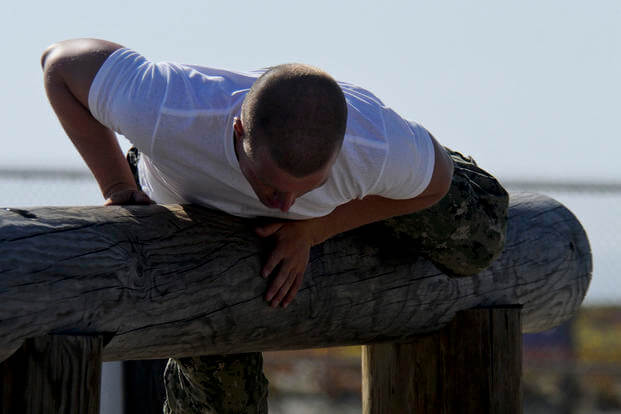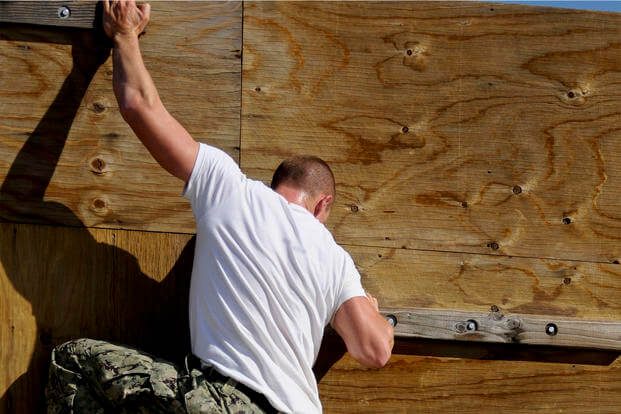There are many options to becoming a Navy SEAL, but each route will lead you to the Naval Special Warfare Center, where Basic Underwater Demolition/SEAL (BUD/S) training takes place in Coronado, California. A student can attend as an enlisted or officer. In fact, both attend the same training together, where your Special Warfare reputation begins to form.
Although there are several routes to get to BUD/S, there is only one way to become a SEAL, and that is through BUD/S. Here is a common question from a young man who has finished college and is curious about his route to BUD/S.
Hey, Stew,
First, I appreciate all of the training content and tips that you put out on a regular basis. I have been using your workouts for over 5 years now, and I now have a degree and am in the dilemma whether I should go officer or enlisted in Naval Special Warfare. I've read that enlisting is a less tedious process, which is why a majority of candidates choose that route. On the other hand, I know that an officer will be put into a leadership position right away and also get higher pay. Having been an officer in the SEAL teams, I'd appreciate any input you can offer on this subject. Thank you. Brian
Brian, you are not wrong with what you have read, but here are some things to consider about your options ahead of you.
1. Yes the enlisted route is a much less tedious process, but that is not necessarily the reason why most candidates are enlisted. The reason why most candidates are enlisted and the officer route is so competitive is that the Navy needs more enlisted SEALs than officer SEALs on about a 10:1 ratio.
2. To enlist as a civilian, you simply go to the local Navy enlisted recruiter and request the Navy SEAL program. From there, you will take the ASVAB, the C-SORT (Computerized-Special Operations Resiliency Test) and go through the Military Entrance Processing Station (MEPS). Once cleared medically, you will take physical screening tests (PST) with your SEAL mentor. As you progress into competitive scores, you will be selected and get a date to attend boot camp, Pre-BUD/S at Great Lakes in Illinois, then finally arrive at BUD/S in California. This process can take several months.

3. To join the Navy as an officer as a civilian after college, you will request to attend Officer Candidate School, followed by BUD/S. The officer screening is different. If you get selected to attend the selection program, you will attend SEAL Officer Assessment and Selection (SOAS) during the summer after your application was submitted in January or February of that year. You will attend SOAS with ROTC, the U.S. Naval Academy and other service academies' cadets and midshipmen seeking one of the few officer slots they offer each year (usually 50-70 slots). This process can take a year or more from submitting an application to receiving your OCS date.
The biggest questions people ask are:
What Is the Difference Between the Navy SEAL Enlisted and Officer Jobs?
The simple answers are the leadership roles and more base pay, but also a straightforward officer career path that is consistent, to a degree. There will be more administrative responsibilities as an officer. In wartime, that career path can change, depending upon the needs of the SEAL teams and your operational capabilities.
The enlisted career path allows you to train in different areas of expertise from communications, weapons and explosives, medical, snipers and other skills the operational platoon requires to be forward deployed. The enlisted members also receive more specialty pays and reenlistment bonuses, which help bridge the gap between junior officers and enlisted.
Therefore, more money should not be the reason why you select the SEAL officer route. Your reasoning for going that route must be that you want to lead, have greater responsibility and be held accountable for yourself and your men.
The best comparison I have heard about the role of the officer in the SEAL platoons is that of a quarterback on a football team. That quarterback may be a rookie but, by position, is in charge of getting the team down the field. They make decisions, based on personal ability and advice from their veteran linemen and coaches. The young platoon commander is similar and, with more experience, can advance into bigger leadership combat roles well into his career at different SEAL teams.
How Long Can an Officer Stay Operational, Compared to the Enlisted SEAL?
This depends on how your body handles years of deploying and training. After 10-12 years, the officer typically will be less operationally involved in the platoon setting. He might be part of a task unit/element as a lieutenant commander or at the United States Naval Special Warfare Development Group (DEVGRU) as a squadron commander. If you are able and capable, this is how you would extend your operational life into your mid- to late 30s.
Remember, this is a young person's job, and later in their careers, the veterans with the experience become the teachers (senior enlisted and warrant officers). Both jobs are a calling and are for a special kind of person -- a teammate first. You cannot go wrong with either option. However, if you select the enlisted route, you have until age 36 until you can attend OCS and go back to the teams as an officer with incredible experience and knowledge of what a good officer should be.
Stew Smith is a former Navy SEAL and fitness author certified as a Strength and Conditioning Specialist (CSCS) with the National Strength and Conditioning Association. Visit his Fitness eBook store if you're looking to start a workout program to create a healthy lifestyle. Send your fitness questions to stew@stewsmith.com.
Want to Learn More About Military Life?
Whether you're thinking of joining the military, looking for fitness and basic training tips, or keeping up with military life and benefits, Military.com has you covered. Subscribe to Military.com to have military news, updates and resources delivered directly to your inbox.




















